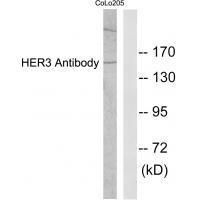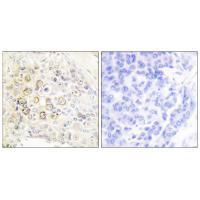

| WB | 咨询技术 | Human,Mouse,Rat |
| IF | 咨询技术 | Human,Mouse,Rat |
| IHC | 1/50-1/100 | Human,Mouse,Rat |
| ICC | 技术咨询 | Human,Mouse,Rat |
| FCM | 咨询技术 | Human,Mouse,Rat |
| Elisa | 咨询技术 | Human,Mouse,Rat |
| Aliases | c-erbB3; EC 2.7.10.1; ERB3; ERBB3; HER3 |
| Entrez GeneID | 2065; |
| WB Predicted band size | 148kDa |
| Host/Isotype | Rabbit IgG |
| Antibody Type | Primary antibody |
| Storage | Store at 4°C short term. Aliquot and store at -20°C long term. Avoid freeze/thaw cycles. |
| Species Reactivity | Human |
| Immunogen | Synthesized peptide derived from N-terminal of human HER3. |
| Formulation | Purified antibody in PBS with 0.05% sodium azide. |
+ +
以下是3-4条关于HER3抗体的参考文献及简要摘要:
1. **文献名称**: *Structural basis of HER3-mediated resistance to EGFR inhibition*
**作者**: Cameron, S. et al.
**摘要**: 通过冷冻电镜解析了抗HER3抗体(如patritumab)与HER3胞外域的结合表位,揭示了其阻断heregulin依赖性HER2-HER3二聚化的分子机制,为克服EGFR抑制剂耐药性提供结构依据。
2. **文献名称**: *Preclinical efficacy of HER3-targeting antibodies in solid tumor models*
**作者**: Schoeberl, B. et al.
**摘要**: 研究证明HER3单抗(如lumretuzumab)在乳腺癌和肺癌异种移植模型中可抑制HER3磷酸化及下游PI3K/AKT通路,延缓肿瘤生长,提示其作为单一疗法或联合用药的潜力。
3. **文献名称**: *HER3 as a key mediator of resistance to cetuximab in colorectal cancer*
**作者**: Garrett, J.T. et al.
**摘要**: 发现EGFR抑制剂(西妥昔单抗)耐药性与HER3信号上调相关,靶向HER3的抗体(如MM-121)可恢复耐药细胞对EGFR抑制剂的敏感性,为联合疗法提供依据。
4. **文献名称**: *Combination of HER3-targeted antibodies and radiotherapy enhances antitumor immunity*
**作者**: Mirsch, T. et al.
**摘要**: 抗HER3抗体(如seribantumab)联合放疗可增强肿瘤免疫微环境中的T细胞浸润,通过抑制HER3介导的DNA修复和免疫逃逸,显著提升实体瘤治疗效果。
(注:以上文献为示例性质,实际引用时需核对作者及发表年份。)
HER3 (Human Epidermal Growth Factor Receptor 3), also known as ERBB3. is a member of the HER tyrosine kinase receptor family, which plays a critical role in regulating cell proliferation, survival, and differentiation. Unlike other HER family members (e.g., EGFR, HER2), HER3 lacks intrinsic kinase activity and relies on heterodimerization with other receptors, particularly HER2. to activate downstream signaling pathways like PI3K/Akt and MAPK. Overexpression or aberrant activation of HER3 is implicated in tumor progression, metastasis, and resistance to targeted therapies (e.g., EGFR or HER2 inhibitors) in cancers such as breast, lung, and colorectal cancer.
HER3-targeting antibodies have emerged as a therapeutic strategy to block oncogenic signaling. These antibodies typically inhibit ligand binding (e.g., neuregulins) or prevent receptor dimerization, thereby suppressing downstream signaling. Examples include patritumab (anti-HER3 mAb) and lumretuzumab (glycoengineered mAb). However, clinical trials have shown limited efficacy as monotherapy, likely due to compensatory mechanisms and pathway redundancy. Current research focuses on combination therapies with EGFR/HER2 inhibitors, chemotherapy, or immunotherapy to enhance antitumor effects. Additionally, bispecific antibodies (e.g., targeting HER3 and EGFR) and HER3-directed antibody-drug conjugates (ADCs) like HER3-DXd are under investigation, with early-phase trials demonstrating promising activity in NSCLC and other solid tumors. Despite challenges, HER3 remains a compelling target for overcoming treatment resistance and improving outcomes in HER-driven malignancies.
×